Washington Post: Croatia Attracting Digital Nomads During the Pandemic
December 9, 2020 – One of the leading American daily newspaper, the Washington Post, published an article about Croatia attracting digital nomads from the USA while the rest of Europe banned all travel.
The Washington Post wrote about digital nomads who spent several months in Croatia and Dubrovnik during the coronavirus pandemic, said Ina Rodin, the Croatian National Tourist Board director in the United States.
The article states that many Americans decided to travel thanks to the first direct airline between Croatia and the United States, namely between Dubrovnik and Philadelphia, introduced in June 2019. According to the Croatian National Tourist Board, Americans were the second most numerous guests in Dubrovnik last year, with almost 160,000 arrivals and more than 442,000 overnight stays, writes the Washington Post.
Sarah Morlock, a freelance writer and social media manager from Indiana, who worked remotely and spent October and November in Dubrovnik with her partner, shared her experience with readers. She pointed out that when choosing a place to stay, she is looking for historic cities with preserved nature and a good internet connection, and in that sense, Dubrovnik has fulfilled all her expectations.
Binational couples attracted too
Apart from digital nomads, Croatia is also attractive for binational couples who, due to the coronavirus pandemic and limited travel opportunities, organized their meeting in Croatia.
One of the couples who did so was Justin Leung from the USA and Katja Lau from Germany. They were supposed to meet in San Francisco, but the coronavirus pandemic and lockdown thwarted their plans. Therefore, they decided to find a place that welcomed both Americans and Germans and thus chose to meet in Croatia, where they spent one month.
The Washington Post points out that Dubrovnik is trying to attract digital nomads, so a project to introduce ultra-fast broadband Internet was presented in February. Also, a virtual conference "Dubrovnik for digital nomads" was held in October to encourage them to choose Dubrovnik for their remote office.
Washington Post covers this topic right when the introduction of the digital nomad visa in Croatia is increasingly likely. Namely, TCN reported a new update about digital nomad visas in Croatia today, as the Croatian Digital Nomad Association has officially been founded.
At the beginning of 2021, Croatia will introduce a digital nomad visa, which will make it the second country in Europe and the fifth in the world to welcome digital nomads from all over the world.
Parliament Passes Foreign Nationals Act, No More Annual Quotas for Employment
ZAGREB, November 25, 2020 - The Croatian Parliament on Wednesday passed the new Foreign Nationals Act under which there will no longer be an annual quota for the employment of foreign nationals.
None of the 32 amendments put forward by the opposition were accepted.
Under the new law, the government will no longer establish an annual quota for the employment of foreign nationals, but employers will be obliged to submit a request to the Croatian Employment Service (HZZ) to conduct a labour market test.
If there are no unemployed persons in Croatia that meet employers' criteria, employers will then submit an application for residence and work permits to the Interior Ministry, which then requests an opinion from the HZZ regarding hiring a specific foreign national. The procedure, including the labour market test, will last a maximum of 30 days.
The act also stipulates exceptions to the labour market test, which is not conducted for shortage occupations, such as carpenters, masons, waiters, butchers, and for seasonal work up to 90 days in agriculture, forestry, hospitality and tourism.
The new act also introduces long-stay visas (visa D) in the event that a third-country national is granted temporary residence for work, family reunification, university education, research and secondary education.
Another novelty is a more favourable regulation of temporary and permanent residence for Croats with a foreign citizenship or without a citizenship who have a certificate from the Central State Office for Croats Abroad.
In addition, family members of Croatian nationals can acquire permanent residence under more favourable conditions, as can foreign minors who have been granted temporary residence for a period of three years and one of their parents has been granted permanent residence or long-term residence.
The act also gives the possibility of regulating the temporary residence of digital nomads, that is, foreign nationals who work online for foreign employers.
The new Foreign Nationals Act enters into force on 1 January 2021.
Croatia Through the Eyes of a Digital Nomad: Social Gathering Alert, also Known as Olive Picking
November 12, 2020 - Continuing our look at the digital nomad lifestyle in Croatia, the month of November means only one thing - to the fields for olive picking.
In the spirit of age-old Dalmatian tradition, many families offer a home-cooked meal (probably Peka) and plenty of vino in exchange for some manual labor in their olive grove.
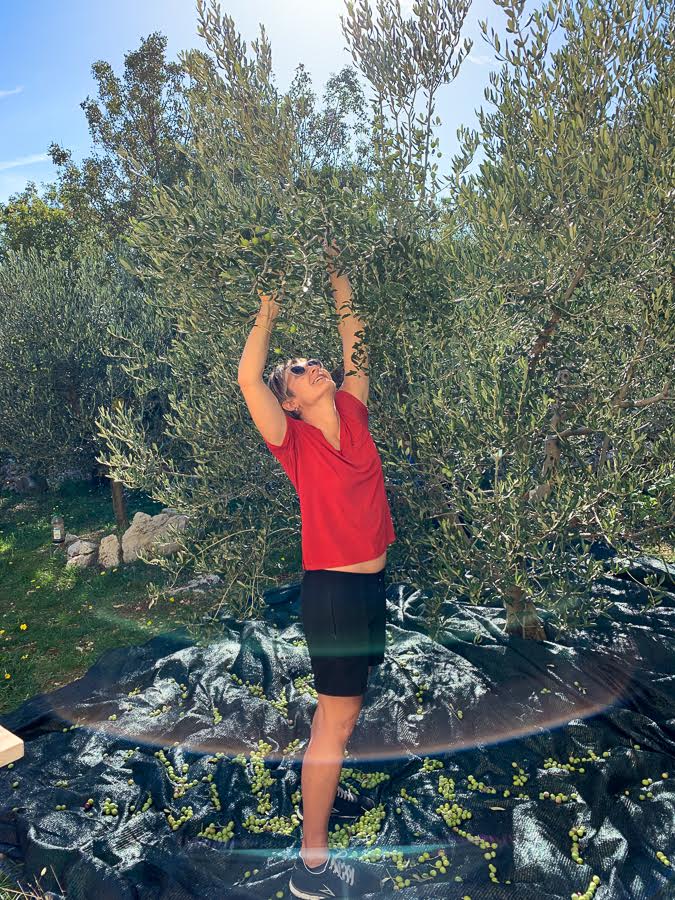
(Working beneath the tree, you have to be careful not to crush the fresh-picked olives on the ground near your feet.)
It’s pickin’ time! Growing up in New Jersey, I know a thing or two about harvesting, mostly the anticipation of delicious, fresh food right off the vine. The state’s motto, after all, is “The Garden State” and it harvests over 100 different types of fruits and vegetables. The official state food is the Jersey tomato. I don’t really like tomatoes but man, ours are super fresh, tender, and seriously good! And the little cherry tomatoes are downright addictive.
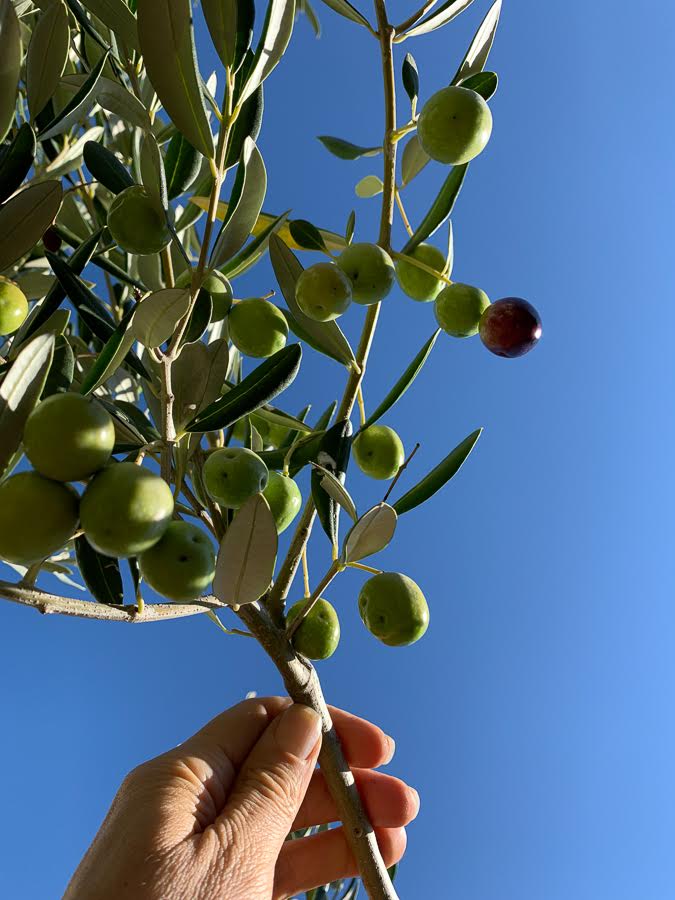
(Olive oil’s flavor depends on the color and ripeness of the olives when picked.)
Fond memories
Some of my fondest childhood memories involve picking fruit in the field with my family. My grandfather loved strawberries and come June we’d drive to the local pick-your-own farm. There’s nothing quite like getting your hands dirty in the strawberry patch on a sunny day and sneaking samples, one after another. Who could resist those juicy ripe jewels? Those were special times—talking, laughing, and gathering food we’d eat together. As soon as we got back home my mother pulled out her strawberry shortcake recipe and got to work. With the smell of shortcake baking in the oven, she’d gently mash the berries. When it was finally assembled, we all sat at the kitchen table and enjoyed a special homemade treat. Warm cake, like a sweet biscuit, layered and topped with a juicy berry mash was spectacular. Our vine-to-table experience lasted only a few hours, but it was some of the best bonding time a kid could wish for.
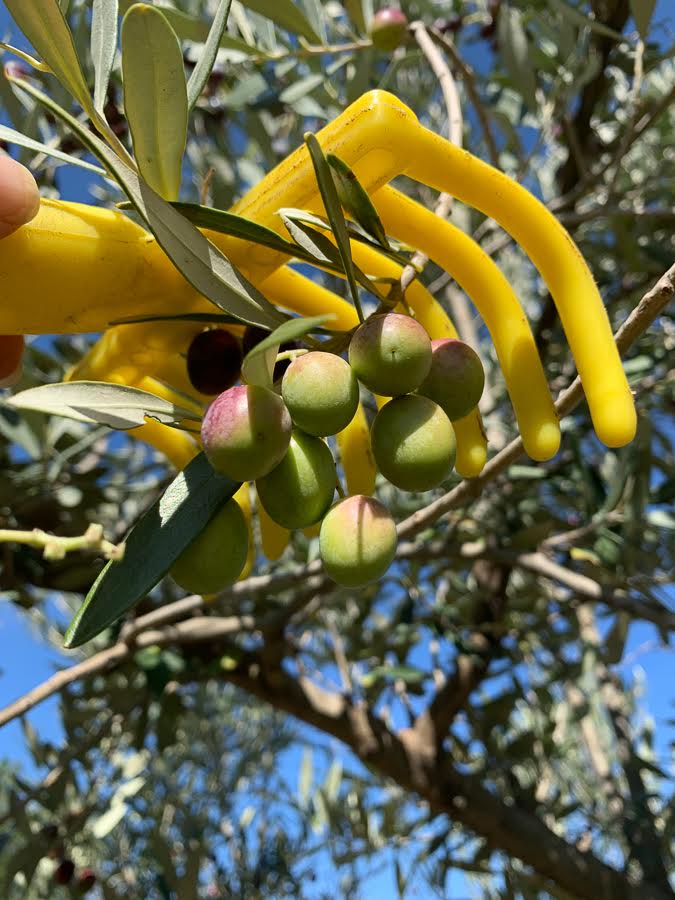
(A small hand rake is the only tool used on this family farm.)
Croatian harvest
A Croatian friend mentioned picking olives at her family grove and I jumped at the chance to help. Spending time with her and the family and enjoying a fun day outside had my name written all over it. I was also keen to experience this harvest tradition and learn more about Croatia’s olive oil—the liquid gold that’s key to Mediterranean cuisine.
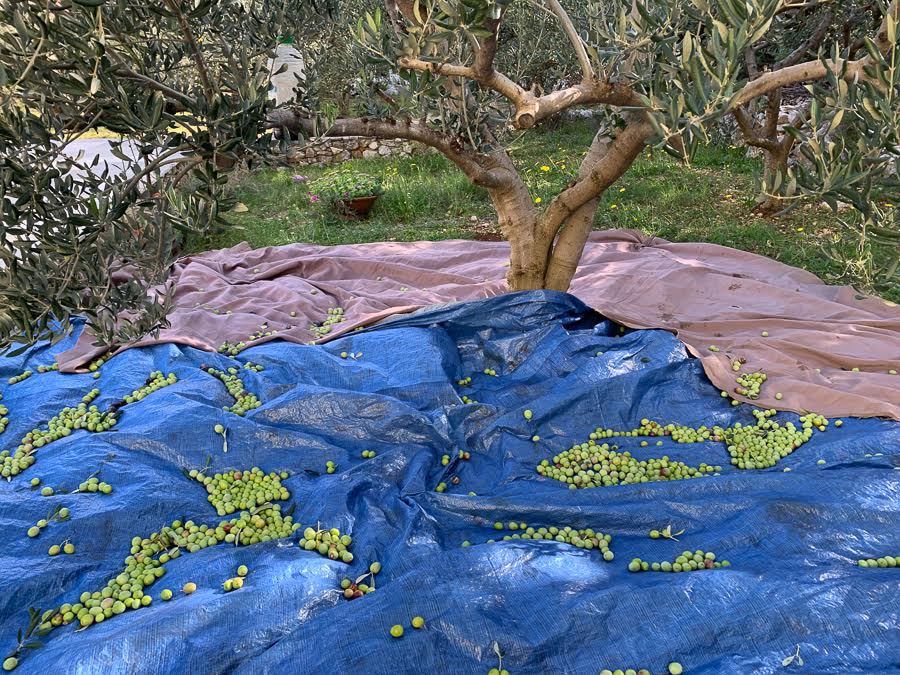
(Placing tarps and gathering up the olives are other jobs on picking day.)
They picked me up in the morning and we drove to the family house in Trogir. Dad laid tarps around the base of the trees, like bibs, while Mom warned me about the sharp leaves. We started in the front yard and picked for several hours until lunch time. It was all done by hand, except for a small hand rake I used to reach the olives in the higher branches. Occasionally one of us would climb a tree and extend our bodies to the point of teetering just to get that patch of olives way up there. We shared stories and laughed.
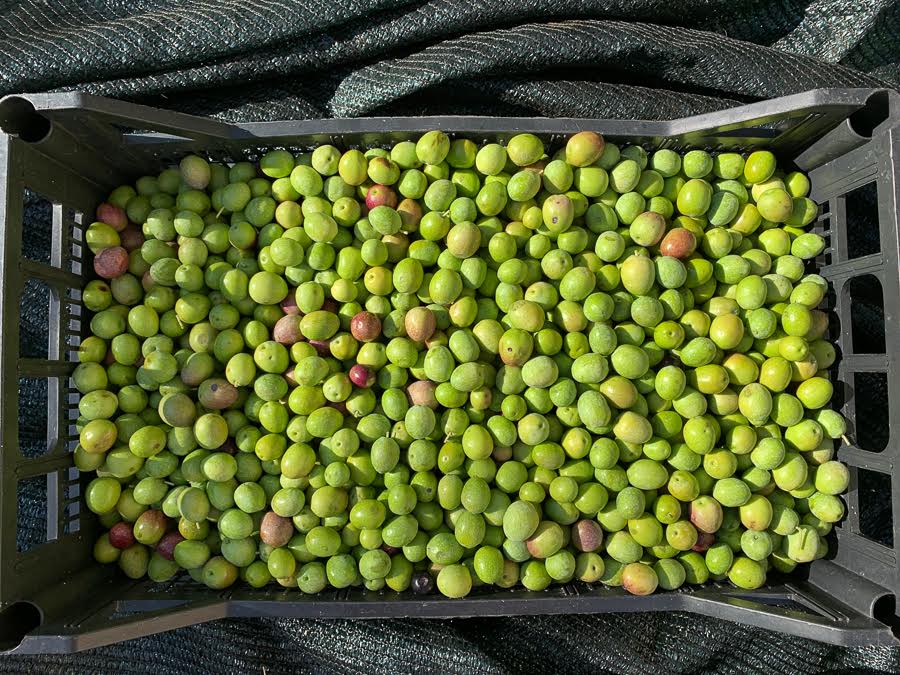
(A fresh picked basket of olives, cleaned from stems and leaves, is ready to rest in a saltwater bath before going to the mill.)
In the background, slabs of beef were being grilled and green beans, potatoes, and other food was being prepared. By the time we sat down to eat, including plenty of local wine, we had conquered the front yard. Conversation around the table was filled with warmth and happiness.
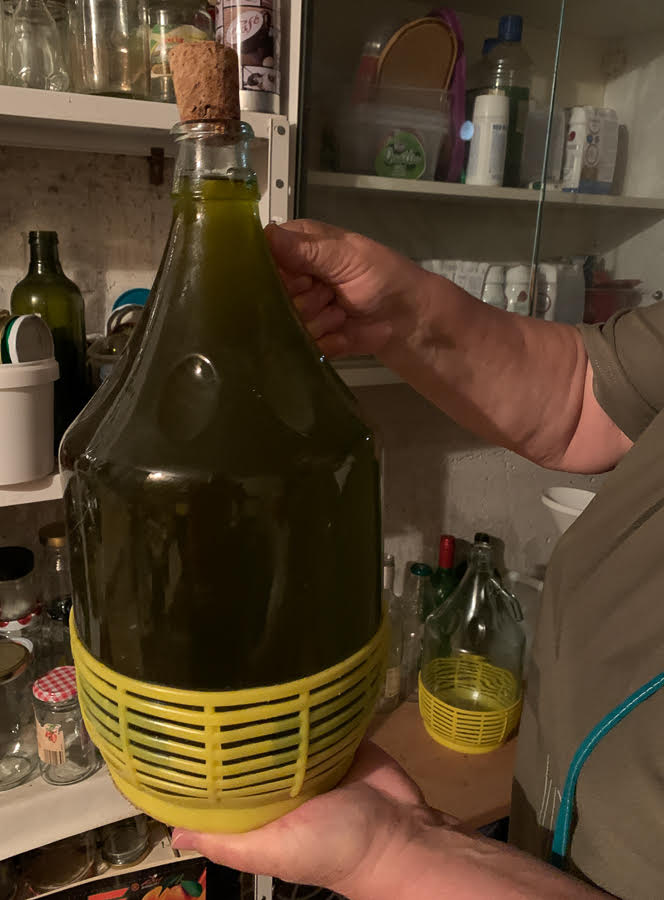
(Hand-crafted olive oil is typically stored in large bottles and kept in dark, dry places to retain freshness.)
With full bellies we went back to the field. I was eager to keep going and my goal was to finish as many trees as possible so the family would be ready for their appointment at the mill. Once you start harvesting the clock is ticking. You have to utilize the olives within three days of picking; if they sit any longer, they’ll oxidize and “sour.” We called it a day at 5pm, only because the sun was setting. We’d gotten through nearly half of the grove and glasses were raised to toast our strong effort.
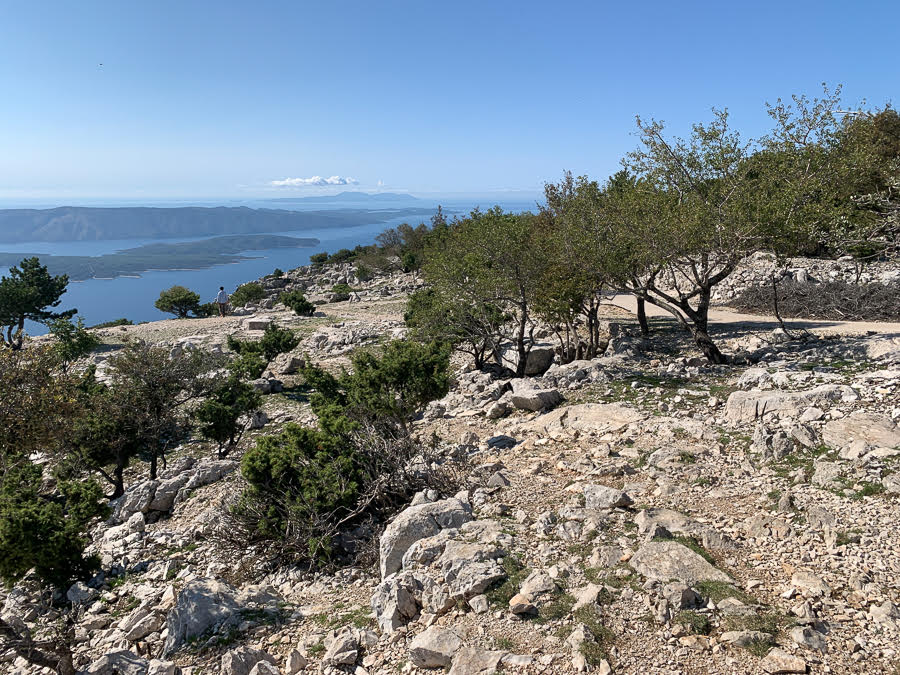
(The olive tree is one of the heartiest trees on earth. It’s resistant to Croatia’s strong Bura and Jugo winds and temperature differences and it thrives in rocky terrain and salty atmosphere. An olive tree can live over one thousand years and occasionally bear fruit for centuries.)
Picking olive trees
Harvesting runs from August through November depending on the region, variety, and desired ripeness. All olives start out green and then gradually become rosy and finally black. Depending on the type of oil you’re making, a combination of all three may be used for pressing.
First, determine the flavor you desire. The earlier you harvest, the more bitter the taste. As olives mature, their flavor mellows. Larger olives have more oil but the content drops as the olives ripen. Green olives have a longer shelf life but tend to be bitter and take several months to mellow. If picking olives for oil, pick those with a light, yellow color. If picking olives to eat, pick green olives when they are mature but before they change color.
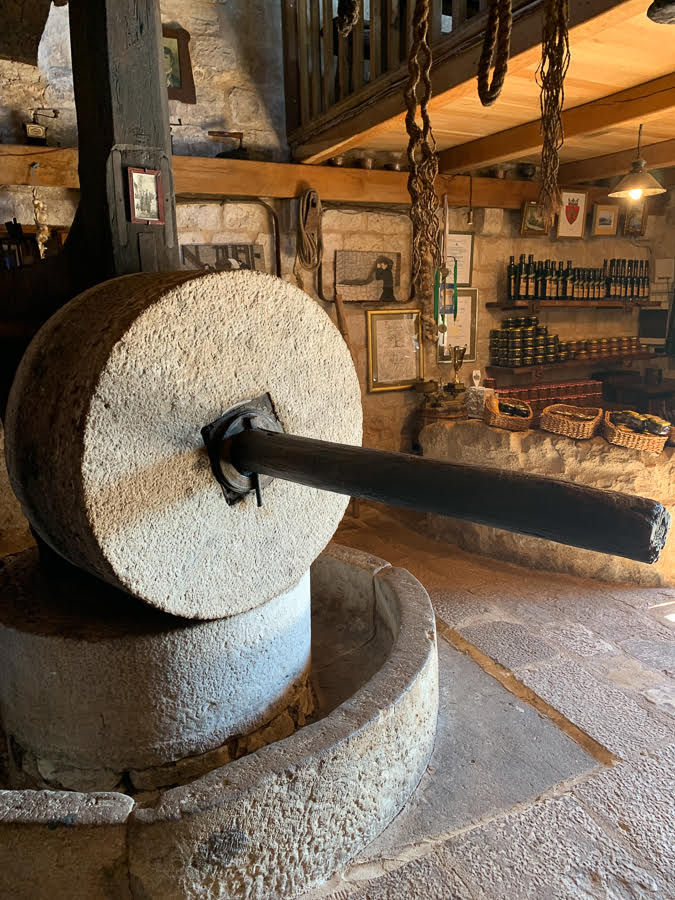
(An old stone mill at the Olive Oil Museum on Brač is a reminder of the hard, manual labor once used in production.)
The Olive Oil Museum
Earlier in the summer I learned about the history of olive oil production on the island of Brač at the Olive Oil Museum. Located in Škrip, the oldest village on Brač, this “oilery” was founded in 1864 and it processed olive oil for 100 years. In 1963 the mill closed shop when new technologies were introduced, namely the hydraulic press. It simply couldn’t keep up with modernization—the yields or the cost of new machinery.
The museum features the original old stone mill, a wooden spindle for pressing, and plenty of traditional tools decorating every inch of the walls and the ceiling, including funny looking goat skin bags that were historically used to transport the oil. Donkeys were strategic partners throughout the fully manual process and it’s an understatement to call olive oil production labor-intensive. To underscore the point, consider that you need 18 pounds of olives to yield one pound of oil.
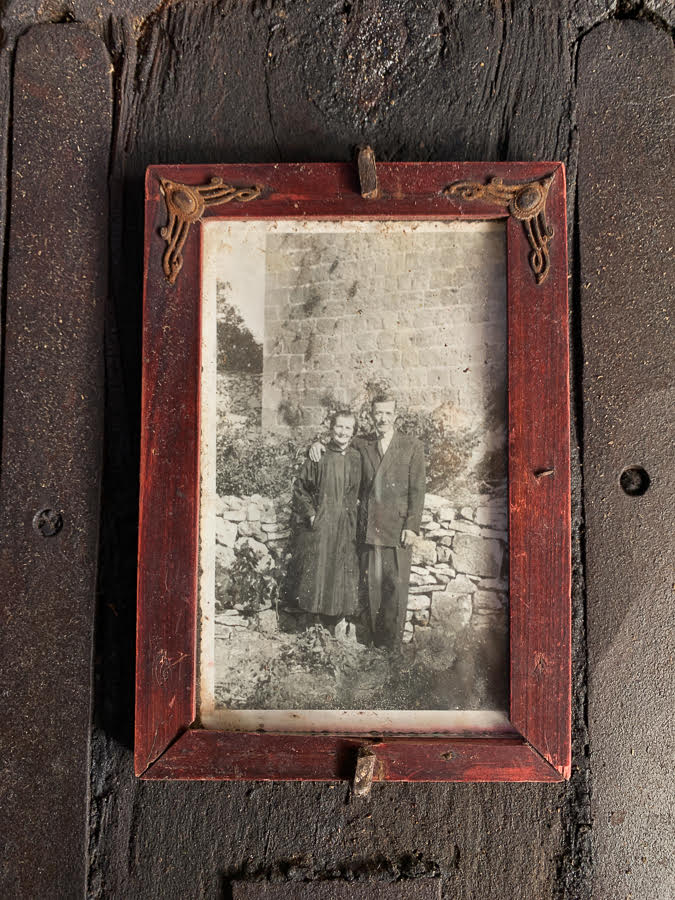
(A family photo from the early 19th century is affixed to the old stone mill in homage to generations of the family business.)
A very brief history of olive oil
Greece is credited as the first place to produce olive oil, around 2500 BCE when it was used as lamp fuel and in religious ceremonies in the Mediterranean. The oil appeared in cooking sometime during the 4th century BCE and in the Middle Ages, olive oil became an ingredient in soap and beauty treatments in Spain and France.
After all those centuries, it wasn’t until the 1960s that flavor became important. The introduction of the refined press transformed olive oil’s commodity status from a frying and cooking product into a delicious kitchen staple. Today we know it as a higher-end oil and a specialty good revered for its health and nutrition benefits.
In the 1990s, the International Olive Oil Council promoted olive oil as a key ingredient in the Mediterranean diet. In 2013, the Mediterranean diet was selected for the UNESCO List of the Intangible Cultural Heritage of Humanity. Interestingly, only seven countries endorsed the nomination and Croatia was one of them.
Taste
So how do you know what’s good? Place a taste of oil, not too much, under your tongue and inhale five or six times through your mouth. You should get a slight grassy taste and a pepperiness at the back of your mouth. Do you taste figs, lemons, or something fruity? If so, it’s fresh. The way to judge olive oil is on smell and taste, not color.
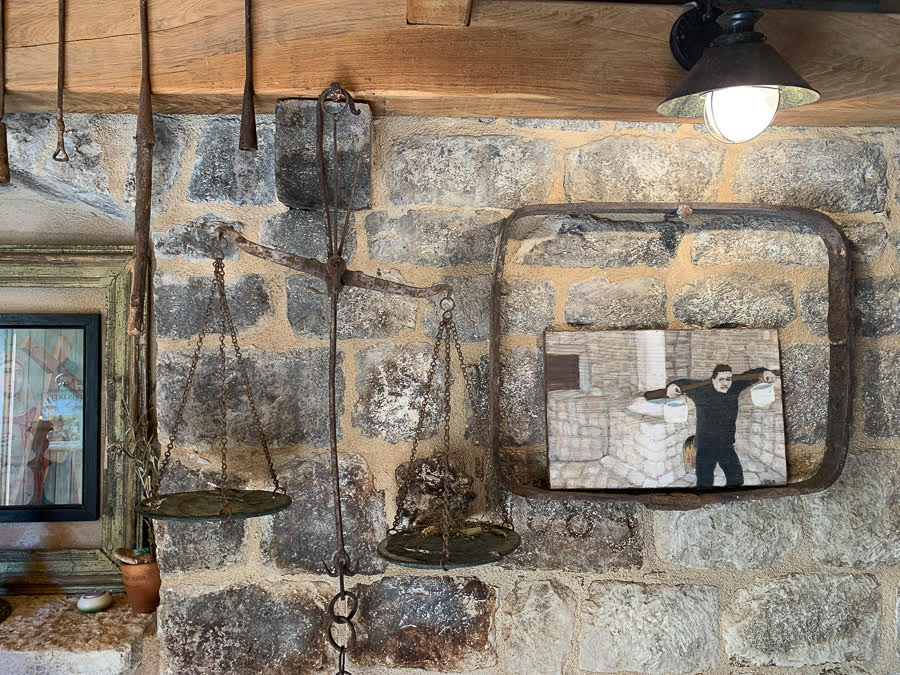
(The Olive Oil Museum displays paintings by academic painter Hana-Marta Jurčević Bulić that depict an earlier harvesting lifestyle.)
A superior product stays in Croatia
I’ve asked why, with so many trees and a superior quality product, Croatia doesn’t export its olive oil? One answer is that small batches are too much work and can’t bring a good enough return. The vast majority of Croatian producers are small farmers producing enough oil for their families and maybe some gifts. Another answer is probably closer to the truth—property here is chopped up so small that there’s no real opportunity for anyone to go big. I was told that in fact, Croatia imports olive oil to keep up with demand. That’s crazy.
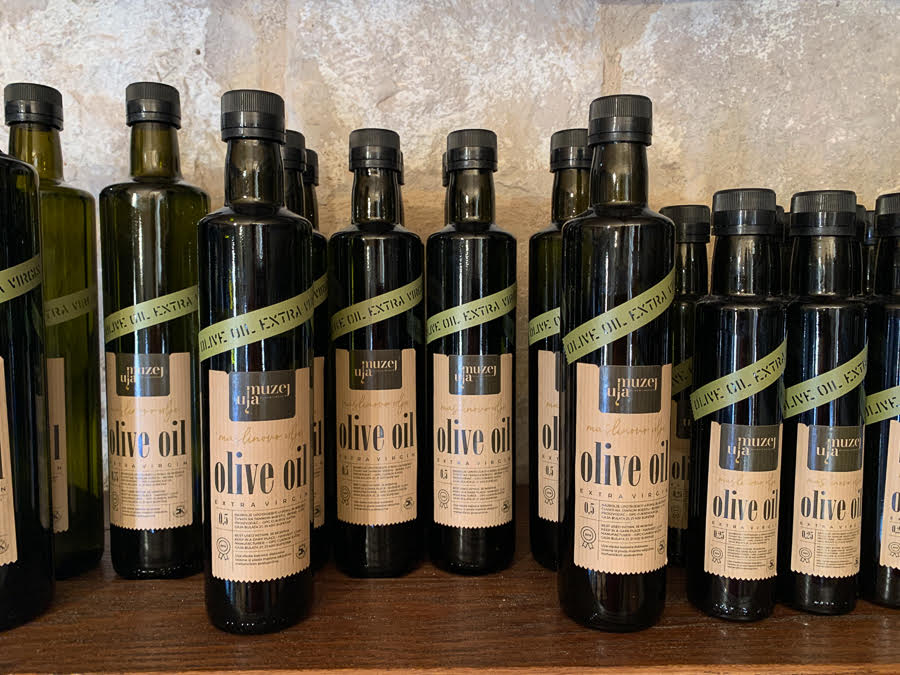
(Olive oil is a core component of the Mediterranean diet and it’s highly valued for its beneficial health qualities. The two most popular types are extra virgin olive oil (EVOO) and ordinary virgin olive oil.)
Nobody gets paid
There’s a lot to be said for Dalmatia’s cultural heritage and olive oil is a centuries-old foundation of life. The history of olive oil shows that people work hard to maintain their traditions as part of their ethnic identity and more recently to support their health and well-being.
Although modern machines and processes have galvanized the olive oil business at large, most Croatians are local farmers for whom the production of oil is a labor of love. It brings feelings of bonhomie and vitality. The reward is the joy of being in nature and a part of the magnificent countryside, having some fun, and sharing a lovely bonding experience with friends and family.
Learn more at TCN’s Digital Nomads channel.
Story and photographs ©2020, Cyndie Burkhardt. www.photo-diaries.com/
For more of Cyndie's experiences, check out her Croatia Through the Eyes of a Digital Nomad column.
Croatia is One Step Closer to Introducing Digital Nomad Visa
November 11, 2020 – Last week, the Croatian government took the first step to introducing a digital nomad visa. In his statement, Prime Minister Andrej Plenković pointed out that the Law on Foreigners, under which the digital nomad visa is regulated, is an important law.
As Lider Media / Nikolina Oršulić reports, the first concrete regulatory steps have been taken to legalize the residence and work of digital nomads in Croatia. Namely, on Thursday, November 5, 2020, at the Government session, the final proposal of the Law on Foreigners was adopted, which will be sent to the Croatian Parliament.
"I think this is an important law. We are among the first countries to legally regulate the issue of digital nomads, and this will be accompanied by appropriate changes to the law in the tax domain, as well as in the health insurance domain," said Prime Minister Andrej Plenković, announcing further legislative steps.
The idea of launching digital nomad visas was first presented in Croatia by Dutch entrepreneur Jan de Jong, who has been building new business opportunities in Croatia for more than a decade.
"I can say that I am satisfied with the pace at which we are working to bring the legislative package needed to attract digital nomads to Croatia. We are currently making great steps forward in answering health insurance questions. With the Prime Minister's statement, we have an official obligation from the highest political level to continue to make extraordinary efforts to adapt the laws regarding taxation and health insurance. I am happy that Croatia will become the leading country in the world in attracting digital nomads," said the entrepreneur for Lider Media.
The legislative story has heated up, so the initiator of introducing a digital nomad visa is already working on the next step – the establishment of a kind of central point to support digital nomads.
"Since we are going in the right direction, I am working on establishing the Croatian Association for Digital Nomads (Digital Nomad Association Croatia - DNA Croatia) whose mission will be to connect digital nomads in Croatia and support them. We are currently in the process of founding this association," said de Jong, who is entering the project with Tanja Polegubić, a returnee from Australia who runs Saltwater Nomads - remote work and lifestyle services for digital nomads in Split, and Karmela Tancabel, a member of the Ilok Cellars (Iločki podrumi) Marketing and Export Board.
The plan is to complete the legislative part to introduce a digital nomad visa by the end of the year, and visas should be available in the first quarter of 2021. In addition to the legal regulation of the status of digital nomads, the draft of the Law on Foreigners brings some other changes.
"The most important novelty is prescribing a new model of employment of foreigners, according to which the employer must first request the implementation of the labor market test from the Employment Bureau to find labor on the domestic market. If there are no unemployed in Croatia, then a request is sent to the Ministry of the Interior seeking an opinion from the Croatian Employment Service. Exceptions to this test are for deficit professions that are usually used during the season," said Interior Minister Davor Božinović at the Government session.
In the draft of the Law on Foreigners, a digital nomad is defined as a third-country national who is employed or performs business through communication technology for a company or own company that is not registered in the Republic of Croatia and does not perform work or provide services to employers in the Republic of Croatia.
For the latest about the digital nomad scene in Croatia, follow the dedicated TCN news section.
Croatia Through the Eyes of a Digital Nomad: Give Bees a Chance
September 22, 2020 - How does Croatia look through the eyes of a digital nomad? TCN is delighted to welcome new columnist Cyndie Burkhardt, who will be sharing her exepriences as a digtal nomad in Croatia. And where better to start - give bees a chance from the idyllic island of Šolta.
Still being a newbie in Split (I’ve lived here since March 1), I’m keen to see as much of the Dalmatian coast as possible. This time of year the islands dotting the Adriatic Sea are calling me. I’ve come to learn that many of them are known for something among Croatia’s vast natural resources and specialties. Šolta has come up several in conversations extolling its reputation for honey. That was all I needed to hear—indigenous food and Croatian culture. I was determined to visit.
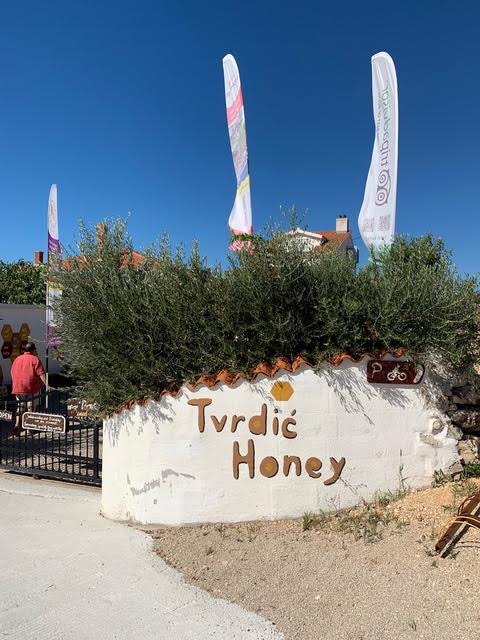
Tvrdić Honey farm
I buy local honey in every country I visit. The most intriguing so far was in Malaysia, where I was introduced to a rare treetop variety. Meaning, industrious “honey hunters,” as they’re called, literally climb to the very top of very tall trees to extract it from a hive. Malaysians claim it has exceptional nutritional value. Taste-wise, it was divine. I view honey similar to wine varietals—environment, land, and weather make it unique. I enjoy experimenting with different flavors in my morning tea, itself from a selection of loose-leaf varietals. Plus, I feel like I’m doing my body a favor. Local honey is supposed to be good for you, possessing vital nutrients that support the immune system and antioxidant benefits.
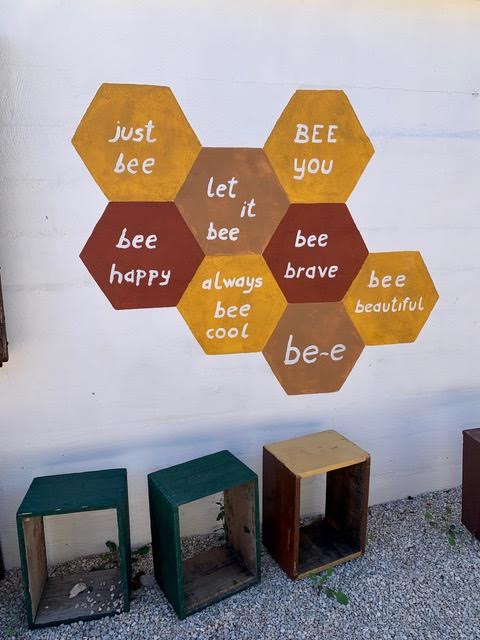
Positive messages reflect family philosophy
I found Tomislav Tvrdić, of Tvrdić Honey, and signed up for his “Give Bees a Chance” tour. I took an early boat from Split and met his father Goran straight away. The minute I saw his warm smile I knew I was in good hands. Goran is a 3rd generation beekeeper, making Tomislav the 4th. His grandfather started the bee farm in 1934 and his father kept it going. Where those two dabbled with it outside of their regular jobs, Goran took it on full-time. He’s clearly passionate about “the animals,” as he calls the bees.
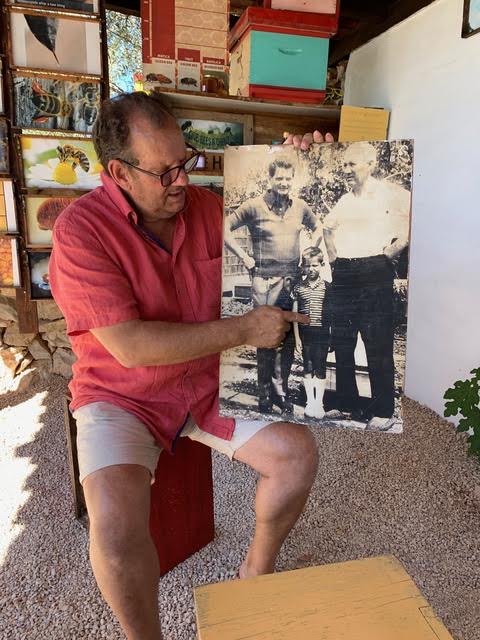
Three generations of Tvrdić family; Goran center
We arrived at the farm he went straightaway to “the store,” a huge fig tree that I could see towering above the roof. When he came bounding down the ladder, he extended his hand with a basket full of the ripe fruit. We chowed down right there, along with his wife and Tomislav, while chatting about bees and the family’s history.

Worker bees in a honeycomb
By the time we moved into the learning center, a modest setup of chairs and props across the yard, we’d established a comfortable conversation. Goran told me about the six products that bees produce. Who knew there were so many? Their bodies emit poison (think bee stings), royal jelly (a top-of-the-line secretion that worker bees deposit directly into the queen as her premium food source), and propolis, a natural antibacterial. Bees also make honey, pollen, and wax.

Fresh honey spun from a comb
Goran is a purist and stores pollen in the freezer for maximum freshness and effectiveness. He also warned me to check the temperature of my tea before adding honey. It needs to be under 105°F (40.5°C). Violate these rules and you’ll kill the product benefits, making it pointless to use them. To him and many others, bee products are medicine, especially Manuka honey from New Zealand. That one is used by doctors for antiviral, anti-inflammatory, and antioxidant properties. At prices up to €200 per jar (roughly $237), you would hope that claims of wound healing, cold and flu prevention, and curing oral ailments are accurate.
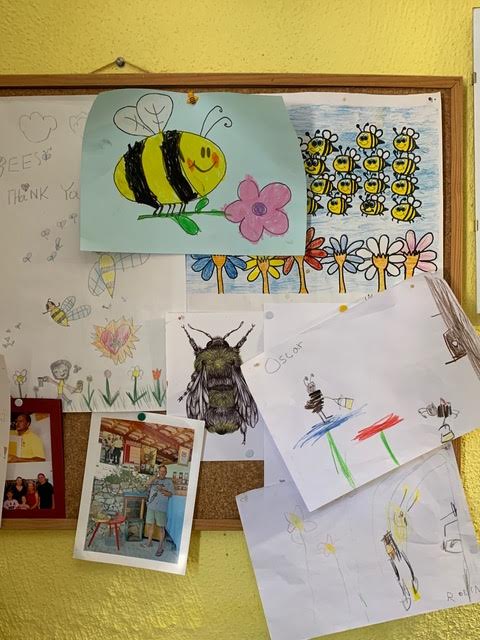
Community board with photos, notes, and kid’s drawings
I’m not a fan of bee pollen. The stuff I’ve eaten was crunchy and pungent, limiting its use to blended foods to make it palatable. Ok for a smoothie, but not my morning tea. Goran fetched a container from the freezer. This pollen was soft and delicious. It nearly melted in my hand and each tiny nugget had a rich, complex taste. Our fingers stained slightly yellow from pinching little bites, similar to the color of turmeric. Mind blown. This, I could eat.
After discussing bee sex and the lifespans of the queen, drones, and workers, Goran and I went into the shop to see a colony at work and taste gooey honey right off the comb.
I noticed a creamy looking product that turned out to be a blend of pollen and honey. In that combination pollen doesn’t need to be frozen. Great, I needed to try it! Šolta’s rosemary grows everywhere and naturally lends itself to ružmarin domaći šoltanski med (rosemary homemade Šolta honey), one of Tvrdić’s main products along with kadulja (sage) honey. Yum. My backpack filled up quickly.
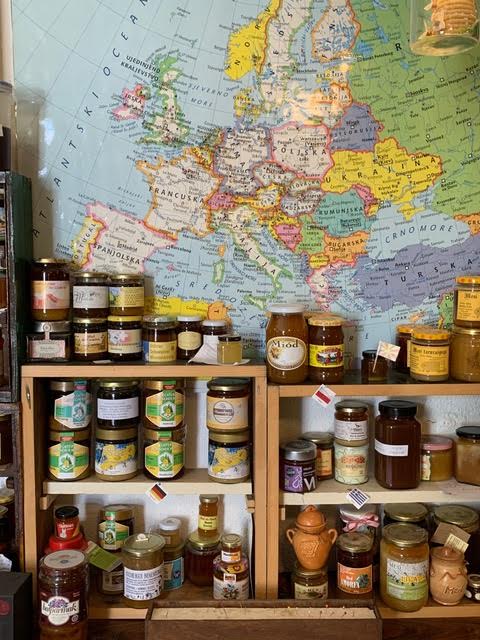
Visitors from around the world send honey from their countries
Inside Tvrdić’s part shop, part museum, I gazed at world maps and a massive, international honey collection while chatting away. I felt a nice connection with Goran and his family and I completely lost track of time. I prepared to leave and apologized for keeping him well past our scheduled tour as the clock ticked toward 2 hours. Oops!
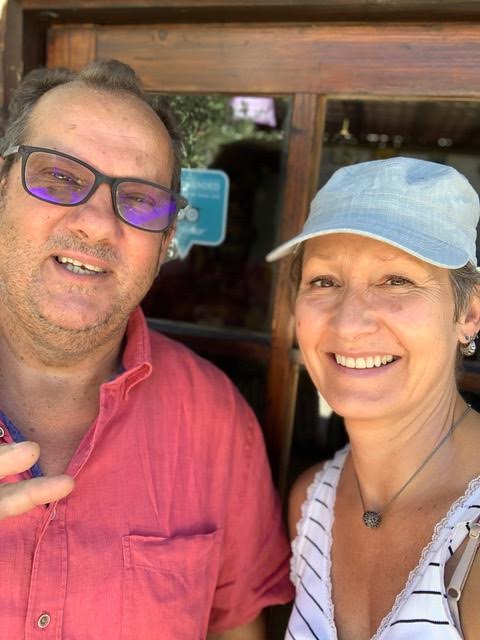
Goran Tvrdić and the author
He seemed completely relaxed and ok with it. For him, life is about doing what you’re passionate about, meeting people, and authentic local experiences. The many cards and personal notes throughout the shop, including drawings from kids and gifts that people have sent from around the world, prove that Goran is onto something. In a final gesture, he sent me off with a container of fresh figs. Could this guy be any nicer? This must be the famous Croatian hospitality I’ve read about.
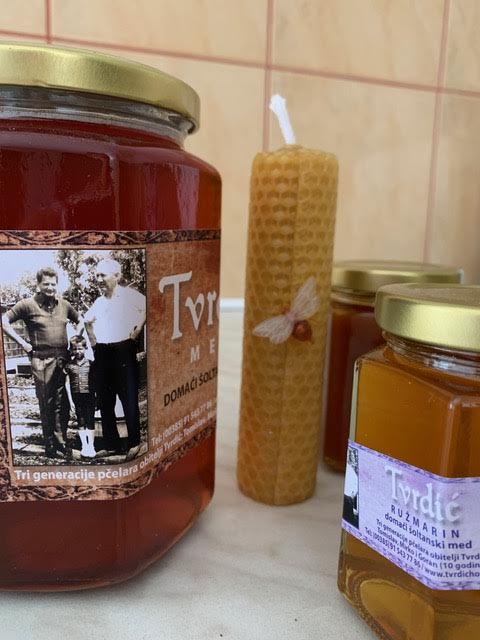
Tvrdić Honey products
When Goran first picked me up at the ferry, he asked about my plans for the day. I mentioned swimming and then lunch after our tour. He dropped me off at a small inlet with clear blue water and pointed out a couple of dining spots. When it was time to eat I headed to Pasarela and settled in for a plate of crni rizot, the traditional Croatian dish I’ve been wanting to try since I arrived here six months ago. It was absolutely delicious. I washed it down with my new favorite drink, Pelinkovać and tonic.
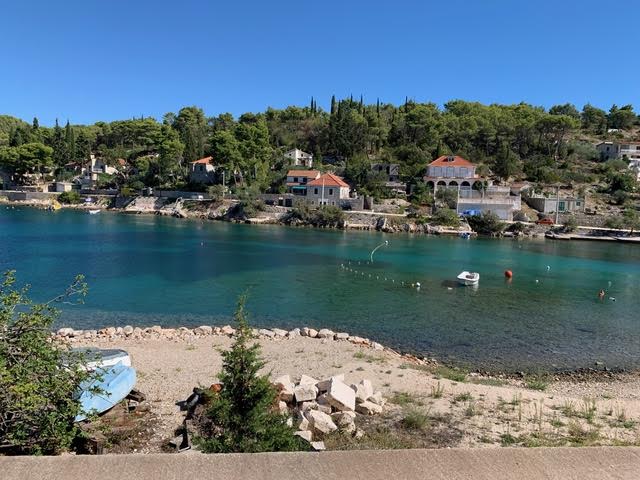
Swimming inlet
I wore a silly grin on my face for the rest of the afternoon, touched by the kindness of strangers and soaking up my perfect Croatian day.
Learn more about Tvrdić Honey and schedule a tour.
Story and photographs ©2020, Cyndie Burkhardt. www.photo-diaries.com.
You can follow the latest from Cyndie's column, Croatia Through the Eyes of a Digital Nomad here.
For the latest news about digital nomads in Croatia, including that sought-after nomad visa, check out the dedicated TCN digital nomad news section.
5 Reasons Why the Croatian Digital Nomad Visa Should Exist
August 22, 2020 - The Digital Nomad Visa has become a hot topic of late. It is especially relevant right now, during the pandemic when a large number of people are working from home. Jan de Jong, a Dutch entrepreneuer in Croatia spoke to Lider and provided 5 reasons why the Digital Nomad Visa (DNV) should be implemented.
1. Projections claim that by the year 2035, there will be a billion digital nomads in the world - highly skilled individuals who are paid above average or very well, who determine their work locations themselves.
2. A visa for digital nomads would bring people from all over the world to Croatia throughout all 12 months of the year, which would enable Croatia to become a year-round tourist destination.
3. According to a survey conducted by Karoli Hindriks, nine out of ten digital nomads may choose to come to your country if you establish special visas for them.
4. A state-of-the-art and mobile workforce are ready to temporarily settle in your country and strengthen the economy with their consumer power, skills, and knowledge. The first countries to open up to them will reap huge benefits.
5. Digital nomads become a huge marketing machine to promote the country when they start writing blogs, recording bets, tweeting, and posting on social networks about Croatia and thus attract more people.
As Jan previously stated, digital nomads would be important for Croatia in terms of marketing, because they would share their experiences, videos, and photos with their friends, and also on social networks, which would be free promotion. Plus, this would be a great way to start 2021.
Read more about the challenges and opportunities for developing the digital nomad sector in Tanja Polegubic's excellent 10 Ways Croatia Will Be At The Forefront of Countries with a Digital Nomad Visa (DNV).
For the latest travel info, bookmark our main travel info article, which is updated daily.
Read the Croatian Travel Update in your language - now available in 24 languages
Join the Total Croatia Travel INFO Viber community.
Bacvice Not Bali: New Saltwater Digital Nomad Beach Heaven in Split
August 19, 2020 - Bacvice not Bali: meet the new beachfront digital nomad chill zone on Split's most famous beach from Saltwater.
One of the (fairly obvious) secrets to a happy life in Croatia is to surround yourself with positive and creative people. While many sit around in cafes and complain about life, there are many creative, positive people existing in their own bubbles around the country, quietly finding ways around the bureaucracy and other stumbling blocks that make life in The Beautiful Croatia a unique set of challenges.
I knew very little about co-working spaces when I first met Tanja Polegubic in Split about 18 months ago, but I was very impressed by her vision, determination, and creative thinking to get around the various barriers which exist in doing business in Croatia. While more and more people are now talking about the digital nomad opportunity in Croatia, Tanja has put a lot of thought into both the opportunities and challenges, as you can read in 10 Ways Croatia Will Be At The Forefront of Countries with a Digital Nomad Visa (DNV).
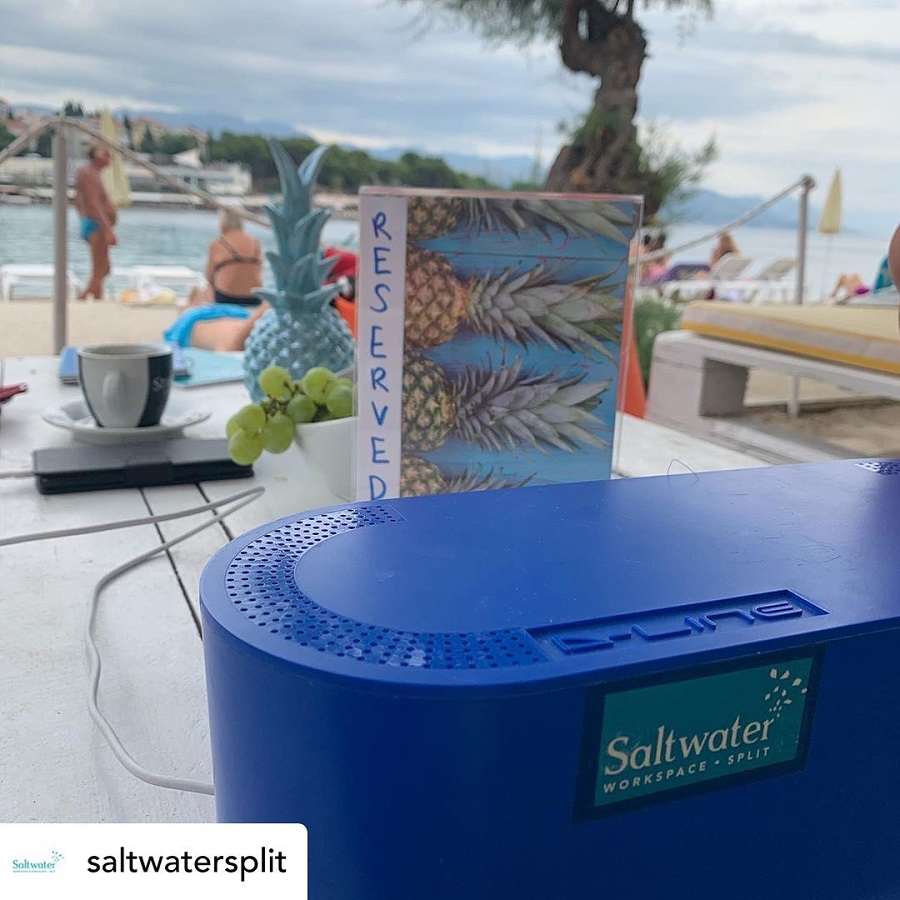
Tanja was one of the pioneers of co-working spaces in Split, with her centrally-located Saltwater office just off the main Split riva by Diocletian's Palace, but she has been working on something even cooler these past few weeks to offer visiting nomads the ultimate chill zone at Bacvice not Bali. A delightful remote worker space at the edge of Split's most famous beach, with its own dedicated space within a very cool bar. I was there a month ago and absolutely loved it, and I am thrilled that Tanja has finally brought the project to fruition - it is now open for business.
How better to introduce it than in the words Tanja posted on Facebook announcing its opening:
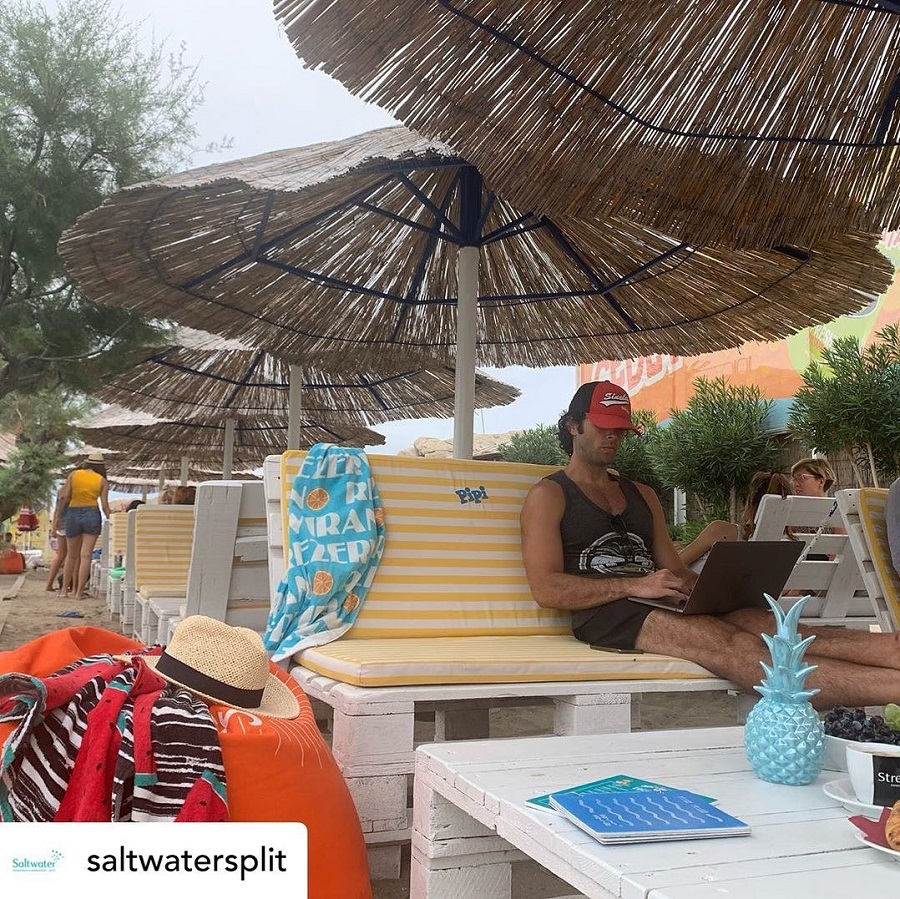
With great #joy - the new part of the Saltwater Workspace Split business is #nowopen. Hoo-frikking-Ray! And #shoutout to my mum Anka Polegubic cause she's awesome! ![]() and pok. Šerif
and pok. Šerif ![]()
It has taken ... weeks! Painting. Drilling. Hardware store-ing. Wifi hacks. Gemišt and gin tastings. Etc.
Thank you to @kavala_beach_bar / @amandaluisebarnes for the setup. And everyone else who has supported this idea and is working here this week.... more important, those who #wishyouwerehere ![]()
![]()
![]()
![]()
![]()
![]()
![]()
![]() The #BobMarley is playing.... the #gemišt is flowing ... and The water
The #BobMarley is playing.... the #gemišt is flowing ... and The water ![]() is fine.
is fine.![]()
#repost @saltwatersplit Bačvice Beach ... The new Bali (well, when you can’t get to Bali).
#todaysoffice #saltwaterworkspace #croatiadigitalnomads
Bookings essential. #staysalty ![]()
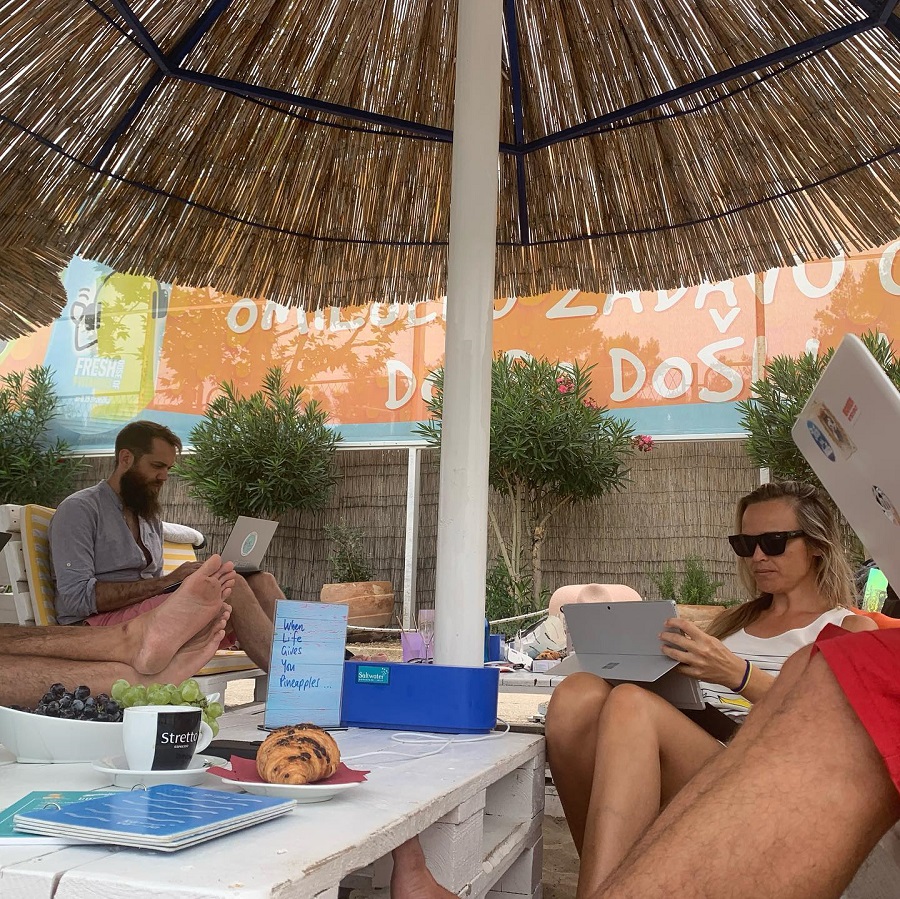
TIME: 9am to 8pm. 7 days / summer only.
PRICE: 150 HRK minimum spend at the cafe/bar. (Tough life!)
Free for Saltwater Workspace Split members.
BOOKINGS: Whatsapp Saltwater +385913308000 or ask for Amanda at the bar (after 12 midday).
Refreshing detox watermelon mint ![]()
![]() smoothies for 35 HRK and Brooklyn Bagel Co. Bagels
smoothies for 35 HRK and Brooklyn Bagel Co. Bagels ![]() with Schmear for ~ 20 HRK and up
with Schmear for ~ 20 HRK and up
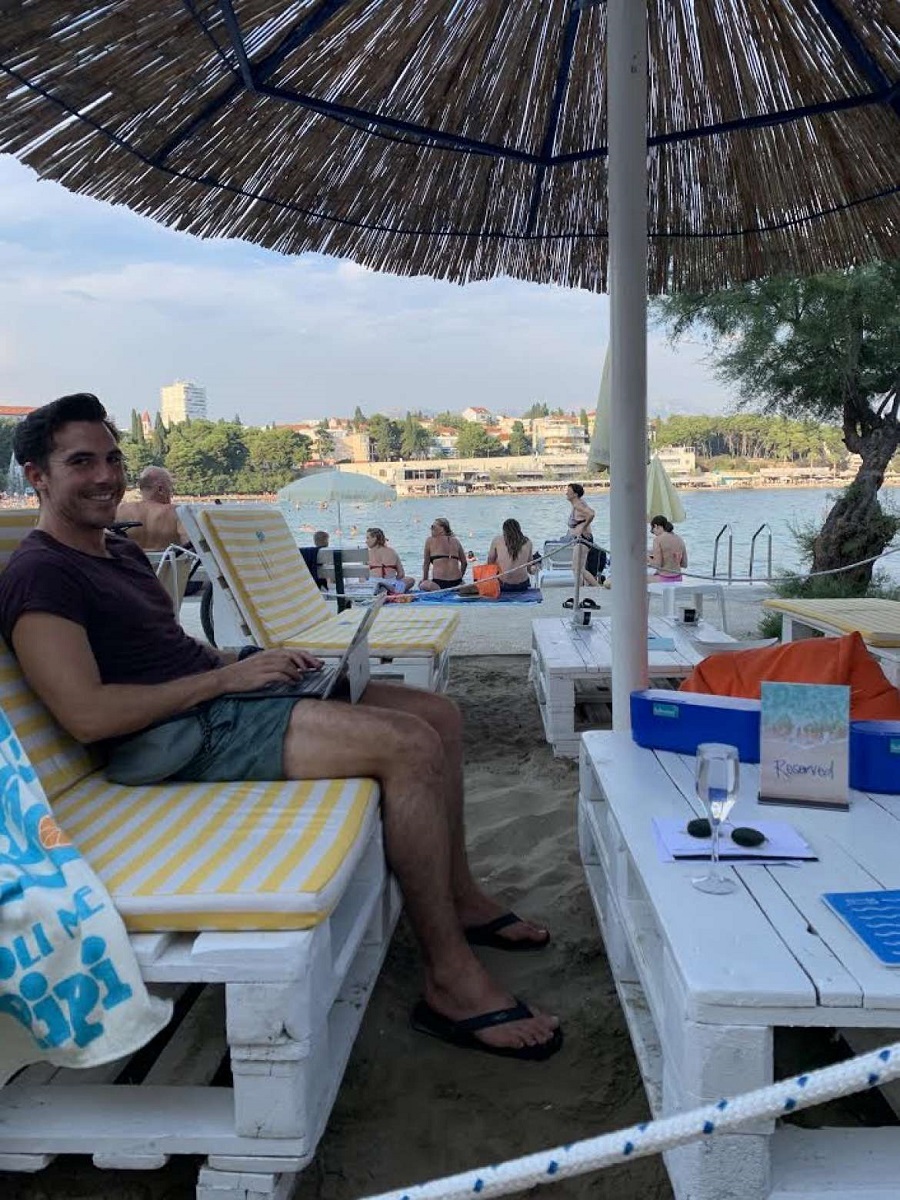
A great addition to the remote working scene in Dalmatia, and the opening comes at a time when there is a concerted push to introduce a digital nomad visa for Croatia, an initiative which was yesterday supported by the Ministry of the Interior. Read more in Croatian Bureaucracy 2.0: Progress with the Digital Nomad Visa.
For the latest travel info, bookmark our main travel info article, which is updated daily.
Read the Croatian Travel Update in your language - now available in 24 languages
Croatian Bureaucracy 2.0: Progress with the Digital Nomad Visa
August 18, 2020 - Croatian bureaucracy 2.0 can be very efficient, it seems, as the campaign to introduce the Croatian digital nomad visa passes an important milestone.
Among other things, it is the speed with which things are happening that is giving me hope for the future of Croatia.
A common-sense idea, put in the public arena, then quietly pursued behind the scenes.
Let's move away from the pointless slogan of Croatia, Full of Life, to something which embraces which sets Croatia apart from the rest - its safety, lifestyle and authentic experiences. Croatia, Your Safe, Authentic Lifestyle Destination.
A destination which is a haven for an increasing number of digital nomads and remote workers, who present a fantastic opportunity for Croatia to completely diversify its tourism approach and become one of the leading markets in Europe for this rapidly expanding - and highly lucrative - new type of tourism, based on its position as the lifestyle capital of Europe.
Nomads are already coming to Croatia - and loving what they find. But without the support of Croatian bureaucracy 2.0, that love affair is restricted to the (typically) 90-day stay that many foreigners are allowed to stay at a time.
A digital nomad visa, first championed in Estonia and now also by the Bahamas and the Republic of Georgia, would change that, allowing wealth-creating remote workers to earn online in their countries, and spend their lifestyle money in Croatia. With more and more people looking to go home to lifestyle around the world, and with Croatia boasting the best lifestyle in Europe - as well as safety, English spoken, accessibility, affordability, excellent food, wine and natural beauty, and plenty to do, the possibilities for Croatia are enticing indeed.
One recent - and very enthusiastic - convert to the digital nomad initiative is Split-based Dutch entrepreneur, Jan de Jong, who has been particularly vocal in calling for a digital nomad visa - and his progress has been impressive. Here is a timeline, which has been documented every step of the way by TCN:
May 5, 2020 - Digital Nomads Enter Croatian Tourism Conference Strategy Debate for 1st Time
May 11, 2020 - Digital Nomad Tourism Featured for 1st Time in Croatian Media
July 11, 2020 - Estonia on the Adriatic? Dutchman Asks PM for Croatian Digital Nomad Visa
July 28, 2020 - Split-Based Dutch Entrepreneur Jan de Jong: Croatia Should Introduce Visas for Digital Nomads
August 15, 2020 - Croatian Digital Nomad Visa One Step Closer? Ministry Meeting Confirmed
That meeting in the Ministry of the Interior took place yesterday, and de Jong posted a summary of it on his LinkedIn page shorted after the meeting:
Ladies & gentlemen, we did it! We are entering round 2!
After my open letter to our Prime Minister Andrej Plenkovic, who from his end engaged his colleague - Deputy Prime Minister Davor Božinović - I can share with you all that I got full support from MUP to proceed with operational meetings on the subject of introducing a digital nomad visa in Croatia!
Full of excitement and with high hopes for Croatia - today I had the pleasure of meeting with Zoran Ničeno, Zvonimir Vrbljanin & Anita Mandic from the Croatian Ministry of Interior (MUP)
Seeing their smiles through their masks ?(which we had to wear during our meeting) when presenting this digital nomad opportunity, confirmed their full understanding of what this visa could bring to Croatia: Year-round tourism.
I could not be happier with the outcome of our first meeting as Zoran Ničeno has committed himself to right away start forming a task force, including people from other ministries, for our next operational meeting - which shall be scheduled on short notice.
Today was a great day as the story continues.
Thank you all for your support, your kind and warm messages and for liking & sharing this post.
Follow me on #LinkedIn to stay up to date.
#LivingTheCroatianDream #digitalnomads #Croatia
TCN will continue to follow this story and update you on progress. The growing awareness of the potential of digital nomad tourism is encouraging to see, as is the government's willingness to look at new ideas in a such a responsive way.
To be continued...
Read more about the challenges and opportunities for developing the digital nomad sector in Tanja Polegubic's excellent 10 Ways Croatia Will Be At The Forefront of Countries with a Digital Nomad Visa (DNV).
For the latest travel info, bookmark our main travel info article, which is updated daily.
Read the Croatian Travel Update in your language - now available in 24 languages
10 Ways Croatia Will Be At The Forefront of Countries with a Digital Nomad Visa (DNV)
August 16, 2020 - As the discussion about a digital nomad visa (DNV) in Croatia gains traction, one of Croatia's digital nomad pioneers offers her thoughts on the exciting possibilities.
Repopulating regional areas. Stopping the brain drain and youth exodus. A restaurant, apartment or tour company open year-round. The digital nomad visa can do all this for Croatia.
Yet - this ‘fix’ isn’t simply an extension of tourism, making Croatia (or any destination offering this) a 365 destination. The introduction of a Digital Nomad Visa now enters migration policy. It will transform society, business and the environment - possibly in an overwhelming rush.
Is Croatia ready?
Like most countries scrambling to reinvent their tourism-based economies, Croatia also now has a digital nomad visa on the table. “Digital Nomads will save, boost and finance Croatia… - especially in ‘off season’”. This is the catch cry. Yet, as more countries also move to digital nomad friendly status, how will we differentiate? How will we get it right - especially with a legacy ‘Smash and Grab’ mass tourism model? Now, instead of the tourist, there will be a transition period with the ‘new’ types of visitor coming here to work and live longer than a short stay holiday. This matter is a mix of migration policy and a year-round tourism offer - going beyond filling apartments from October to May.
Croatia will never be the same. The potential benefits are great. The negatives can be mitigated. Here’s how.
Being at the coalface - that is, running a cowork space and digital nomad services on Croatia’s coast with Saltwater, I should be happy about the introduction of a Digital Nomad Visa.
It’s Croatia - I’m wary. Here’s why.
As a start, here are the top 10 things a digital nomad visa - without proper planning and consultation - will bring, but can be mitigated in advance.
1. The New Cruise Ship Crowds - Coming To a Cafe Near You
The divisive cruise ship crowds we have been ‘spared’ from due to COVI19 mean we have (generally) clearer streets and - in one city, the absence of almost 1 million “just looking, congesting streets and not spending” visitors.
We all know which city.
The current crowds at least shop, stay and dine. A digital nomad visa - without a well-informed strategy, will mean cafes - especially specialty coffee cafes - will be new congestion points. This should be frightening for a cafe culture like Croatia has - and which the Tourism Board identified as one of the ‘charms’, or Unique Selling Points (USPs), about us.
How do we know this? Let’s look at a few examples from popular digital nomad/remote work spots around the world:
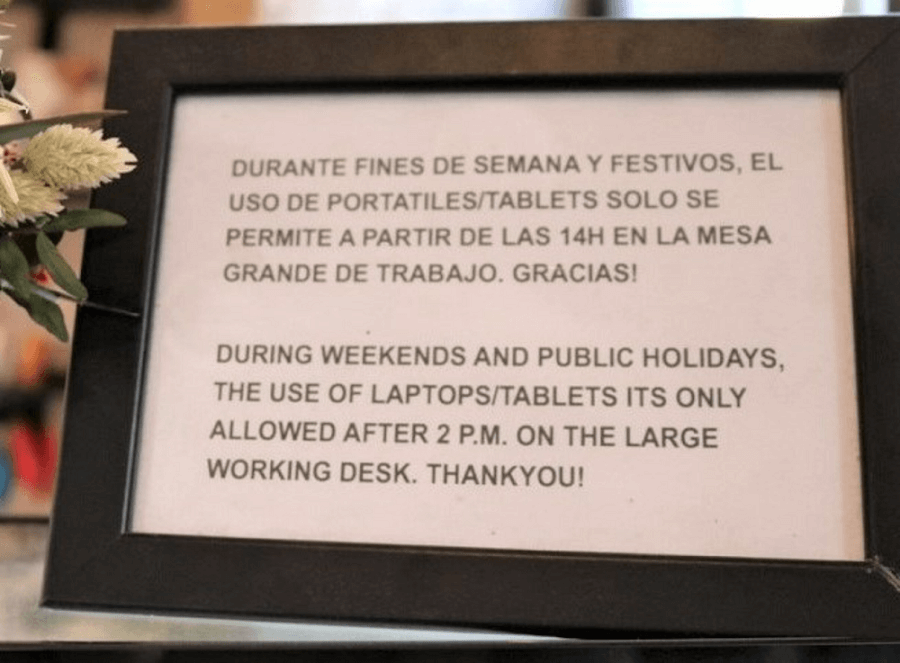
https://www.guidepost.es/wp-content/uploads/2020/02/YSABELLE-KEMPE-Cafe-Culture-Hanso-1-Copy.jpg
- In a small cafe in Cambodia, six millennials occupy the cafe’s largest table, sipping a pearl ice tea for 6 hours, slowing the business POS internet. Gone is the local vibe.
- In Madrid, people get kicked out of cafes if they simply open up a laptop. An already famed digital nomad destination, cafes in Spain however, are prepared. Signage. Minimum spends. Simple stuff. This nomad’s experience in Spain is one of thousands.
- In LA, one of Split’s local specialty coffee providers 4 Coffee Soul Food saw coffee shops full of only people staring at screens, not communicating with each other. 4 Coffee is a hole in the wall - it doesn’t even have seating, yet attracts a cult following and crowd outside.
The number of would-be customers avoid cafes full of computer users. I already see it in Split. I’m one of them walking by... not just because I have an office - I too need to work when on the go. Coffee here is a ritual. One which is about to be transformed, ubiquitously.
Like the ‘Starbucks Office’ at the rise of the Gig Economy (they had good wifi and presence), cafes will be the default go-to for incoming nomads. 5 ways a cafe business can prepare, are:
- Limit the hours a guest can sit and work (restaurants do this).
- If it’s a peak time - state and have your laptop usage policy in clear sight.
- Have designated ‘laptop’ seats or areas custom for computer users.
- Insist on a minimum spend.
- Charge. Yes - charge. Corkage, cakeage… why not computer usage? Especially if it is a laptop-friendly area.
From a policy standpoint, governments should assist cafes with this education and equipment transitions. These will be the first points of call - central to digital nomadism is community. Cafes bring a blend of the cowork vibe, but introduction to Croatia’s ethos.
The right moves here are great for the business, for digital nomads - and you and I, who want to continue to enjoy our coffee.
2. Rents will rise… The owner sees a Cash Cow
Berlin put a cap on their rentals because of its digital nomad allure. It is still difficult to find an apartment. Certain countries impose taxes if a renting period passes a time threshold (investment versus residential property status). The beauty here is, there are a number of examples to draw from and address this one.
As a long-stay accommodation finder, I am already seeing renegade landlord spikes. When a digital nomad ‘extends’ their stay, the pricing is based on the assumption ‘foreign earners’ are more affluent.
Rent rises also impact locals. This is already evident with tourist hotspots. Nothing about this point is ‘news’. This point however needs a considered strategy in how to protect digital nomads AND locals, to avoid the reputation fallout from this.
3. Up Your Offer - Croatia’s USPs.
Croatia needs to get clearer on its offer in comparison to current and emerging ‘hotspots’. Other Mediterranean countries (namely, Spain and Portugal) are hubs for digital nomads. The ‘Balkans’ however, is shaping up as the one to watch, with more trepidation about travelling to Asia, digital nomads consider us the start of a nomadic path to the ‘cheaper part of Europe’.
How do we compare to other Mediterranean hotspots? It’s not us on price.
It’s not us on infrastructure (lack of affordable hubs and city support).
It’s not us on readiness - i.e. educating councils and businesses and locals - ‘hosts’ - on digital nomad etiquette, providing multilingual information, etc. The list is very, very long.
It is us on active experiences, nature, gastronomy, geography, English and digital proficiency of Croatia’s youth. Supporting the sustainable minded businesses who offer these things will elevate the offer to digital nomads. This needs to be implemented into the USPs in the “Digital Nomad Visa” brochure. And the businesses who offer this supported with education and incentives.
Further, a digital nomad visa in itself is an opportunity for local youth to not only get work - but exposure and mentoring from an international audience.
Then there are the things digital nomads actually need, especially in the COVID19 era. And Croatia is NOT ready on these… and will miss the opportunity.
Current providers know these things. It’s not some council worker or travel blogger.
Their needs can only be addressed by smart consultation - a steering committee. This steering committee should consist of current and future cowork space providers, returning youth with NGOs such as Culture Hub Croatia, the hospitality sector, travel agencies, local councils already successfully implementing digital nomad friendly services. And digital nomads.
4. Neglecting regional areas
Ireland’s first Gigabyte town - for the layman, a REALLY fast internet speed town, is in Skibbereen, a rural area. Its population is about 2,000. On a recent “Recovery of the Coworking Sector” online conference hosted by EdgeRyders, the Irish contingent, who were the most prominent in the group, related the country’s approach to create even more rural hubs as a direct result of COVID19. Repopulating rural areas, working for a company based in Dublin.
This alone is one approach to stop the already high rents in tourism hotspots. Other approaches are having more regionally focused requirements for digital nomads.
Take Australia’s migration policies, boats aside.
One of Australia’s youth working visas, for those who wish to extend their stays, stipulates they must do 3 months of specified work. This includes fruit picking, fishing and now bushfire recovery work. Labour shortages. Desire to stay in a country. Two birds. One stone.
Also in Australia, for citizenship and residency requests, priority is given to anyone taking residency in non-metropolitan areas - acting like an ‘express lane’ to getting your required permit - and, repopulating regional and rural areas.
5. Ireland… and other places the Youth and Brain Drain Professionals Go
Dublin is a pertinent example due to its headquarter status in Europe for many global businesses. Add to that, a lot of remote work suitable jobs. And a lot of youth from Croatia.
These tides are turning. This coming week, I am off to a small coastal town. The mayor is offering central office space for peppercorn rent, ie. 1 kuna. There are already 4 young tech workers who have returned from Dublin due to COVID19. Comparing rent in Dublin to what is likely a family-owned property is a no-brainer. Even if just temporary. Companies in Dublin are offering remote work as a perk to attract and retain talent. Traditionally, Portugal is the preferred location (refer to their golden visa and Lisbon’s startup initiative from 2008, it is no wonder).
“Why not Croatia?” asked the recently returned tech guy. So am I. Are you?
Any savvy digital nomad knows returning to a family-owned property - if only for a short time, will save living costs in larger cities, and the flow on effects are immense.
- The youth exodus and brain drain would now be by choice not necessity and the upcoming young generation will see, first hand, remote work opportunities in action.
- Colleagues. Friends. Homeswaps.
The opportunities are exciting and endless with a program which supports what is effectively a global network of ambassadors who can bring guests to their hometowns. Digital nomads invite friends and family to join them. This in some cases triples how many visitors 1 digital nomad brings. And I consider we all know the power of human contact ‘spread’ and numbers by now.
A digital nomad visa - while great for a non-citizen, should also recognise returning remote working Croatian nationals, and their role in encouraging their network of remote workers to visit. This means creating hubs - i.e. city supported venues - for locals to work, and therefore an environment ideal for digital nomads.
It is after all, the local culture people want to experience. This is hard if there’s no one there. And when we don’t have the infrastructure or open-mindedness of decision-makers.
6. Local Opportunities - Capacity Building
Integral to offering a DNV are the opportunities for locals. And not just as service workers. Upskilling. Bringing their remote work jobs and experience here are lawyers, marketing professionals, coaches, software developers, serial entrepreneurs. Many with an interest in local community engagement and volunteering.
Adding programs to participate in mentoring and volunteering (like the fruit picking example in Australia above) are key. In this instance, it could be coding camps.
Lectures. Training. Otherwise, the disparity in wages and skills will only widen. This is an opportunity to create lasting impact, and a sustainable model.
Integrating a ‘return of service’ component (volunteer or otherwise) can be part of a DNV to differentiate the offer from other digital nomad hotspots. The Australian example brings 3 months of specified work if looking to extend. Crafting the right balance of options, which bring benefit to Croatia and the digital nomad is possible.
And, surprisingly easy to implement.7.
7. Full transparency and digitalisation from the start
Ease. Online. Multilingualism.
No paper.
No pečat (stamp).
Only a seamless, local-made (why not while we’re at it) informative platform to make applying and maintaining a visa world-class.
There are many examples to base it on. This one will do.
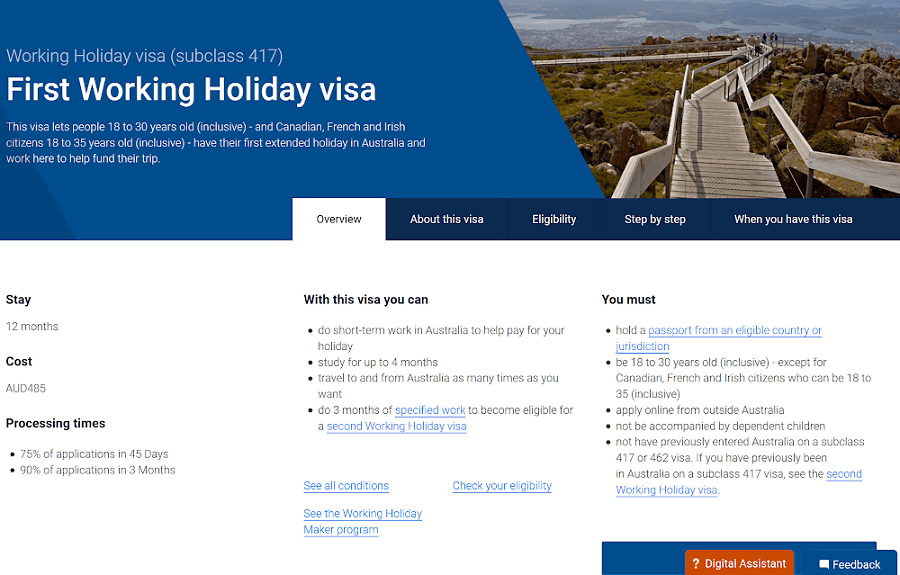
https://immi.homeaffairs.gov.au/visas/getting-a-visa/visa-listing/work-holiday-417/first-working-holiday-417
8. Local Council Education and support
In 2018, the European Creative Hubs Network held their finale event in Brussels, after a 2-year pilot project looking at this sector and with the motto “strength in numbers”. There were many takeaways, but among them - the triad of collaboration between the local council, remote worker and business were key.
Local councils require two things to start to assist the implementation of a Digital Nomad Visa in Croatia. The first is information and education. The next is how to deliver this.
As an example, knowing a digital nomad will invite friends and family, the digital nomad sitting in a small cafe, say in Vodice, appears small. However, their network is wide. How can the local council support this visitor? Through user case scenarios, local councils can understand who digital nomads are, what they need - and what the city already has and can offer.
Abandoned school buildings, empty hostels, out of work taxi drivers. The infrastructure is there. It is not a great deal of imagination required, but a city can provide a complete offer to digital nomads with the right planning.
9. Tenancy Protection
Rent has been noted, but this point is so key - it needs to be added as its own point. Longstay renters have notoriously been ‘promised’ year-long rentals, only to be kicked out on 1 May, and facing a high priced rental market as the tourism season begins.
As the provider of a coworking space, rental protection does not exist. My first space was flooded - which the landlady saw no problem with, and in fact wanted to raise the rent by 1000 euro. My second space had a police station visit in the first week, and one in the final week when it was finally time to exit. I do not recommend opening a coworking space in Croatia - as things stand. I also know other spaces are at the mercy of increased rents, when due to lack of being a strong digital nomad destination, the arrivals into Croatia are unpredictable (COVID19 aside), we have no Gateway city market, and if in a tourist area, commercial property prices in good locations make the entry barriers very cost-prohibitive. Our current space is a building with limited working hours, so it is impossible to work to a digital nomad time zone.
I am looking at alternatives, and pleased to report I am working with boutique hotels and a progressive-minded young couple with a hostel in Split.
There is a culture of landlords again seeing a “Cash Cow” and breaking 3-year terms (my first space was occupied for 1 year, and the rental agreement was 3. The piece of paper, clearly worthless).
In order for this sector to survive and accommodate digital nomads - tenancy protection needs to be stronger. Digital nomads are ‘community’ minded, and with the increasing virtual lifestyle we need, In Real Life (IRL) meetups will be among the most valuable experiences to offer.
If we aren’t supported in this area, a Digital Nomad Visa will disappoint arrivals and not be the ‘saving grace’ Croatia thinks it brings. “Help” - is what I am really saying.
10. Taxes, Legal and Insurances
Many visas have a list of requirements, from proof of enough funds to health insurance. Coming to a new country brings significant costs to a visitor. Add unfamiliarity with a system - this will prove even more of a struggle, particularly with accessing information. Concise, clear information and access to official assistance is required to ensure digital nomads are clear on their requirements. Can the current system cope? The all too familiar “I went to the counter two days in a row and got conflicting information” is not acceptable and potentially damaging to a digital nomad’s finances, immigration status and health.
With COVID19 especially, healthcare eligibility and requirements is another factor which needs clear communication.
The above-mentioned steering committee to develop a digital nomad visa requires professionals in this field to contribute to shaping a Digital Nomad Visa.
While these seem like onerous tasks - the benefits of bringing in digital nomads to Croatia far outweigh the initial ‘setup’ and maintenance required. The number of unemployed youth about to hit the HZZO after the ‘season’ could instead have the opportunity to be part of this delivery - and shaping their country, gaining experience and ensuring a prosperous future.
To end, last night sitting around a table on Ciovo, a Slavonian Croatian family now living in Stuttgart asked what I did. I explained I was born in Australia but run a coworking space. The husband, Ronald - looked at his wife and said they could finally return. She could bring her insurance job and they could even spend 6 months in Dubrovnik - together, as he has business lined up there. And he had read about “neki Nizozemac” (some Dutch guy) talking about digital nomads. Their son of 13 was with them. The wife wondered if the company would allow it. I suggested she propose a 1-3 month trial, after which she could return. Proposing a trial is a common practice in case you are considering a remote work location.
I returned to Split wondering - is this the start of a return wave? I hope so.
If you are business, local council, current or future digital nomad - and have any questions or comments about improving your business or town or what a digital nomad visa should have, please share them via This email address is being protected from spambots. You need JavaScript enabled to view it. Subject DNV.
Barbados, Estonia & Georgia: Time for Croatia to Follow Digital Nomad Visa Route?
August 3, 2020 - Tourism is changing, and Croatia is in pole position to take advantage. Is it time for the digital nomad visa?
Imagine you came on holiday to a beautiful country like Croatia. You dipped your toes into the azure waters of the Adriatic, sent your Instagram photos back to your friends, who would surely be on the next plane. And, as you sipped on a cold beer, contemplating which of the 1,185 idyllic islands you would explore next with your remote working lifestyle, the perfect picture becomes tinged with sadness.
For you are not the right type of foreigner, and your access to this paradise is time-limited.
Never mind that you are spending heavily in the bars and restaurants.
Never mind that your Instagram posts are bringing your high-spending friends to this Adriatic heaven - for a while at least - so that they too can enjoy, spend and inspire their friends to travel.
All things must come to an end, for foreigners can only visit for a finite time, and then they must return whence they came. For this is Croatian bureaucracy, baby.
Croatia is blessed with the most beautiful country in Europe, bar none. It has developed the best lifestyle in Europe, bar none.
If it could only be blessed with common sense, the future is incredibly bright.
Estonia has done it.
Barbados has done it.
Georgia has done it.
And they are all set to - or already are - benefit big time.
A simple vision.
A simple piece of legislation.
The digital nomad visa.
More and more people - wealth-creating people - are working in the same global office. It is called the Internet. There are only two variables in the office - connectivity (3G, 4G, 5G) and time zones. Apart from that, the office can be almost anywhere in the world.
When people leave the office, they go home. Some go home to their friends and family in the village of their birth, but a growing number come home to - and spend money in - a home which is based on lifestyle.
Leave the office and have a swim in the Adriatic before dinner, that kind of thing.
If Croatia has the best lifestyle in Europe, and more and more wealth- (and job) creating entrepreneurs working remotely are looking for lifestyle opportunities, has Croatia ever had a better opportunity to redefine its tourism on sustainability and a future direction based on safety, healthy living, lifestyle and authentic experiences?
A simple match made in heaven.
So what is needed to make this work? A tiny compromise from the infamous Croatian bureaucracy.
A digital nomad visa
Rather than restrict a wealth-creating foreign entrepreneur with his beach time, why not encourage them to come, relax, enjoy the lifestyle, inspire the mindset... and spend?
Estonia - with the highest number of unicorns per capita in the world - has led the way. Georgia has done it. Barbados has done it.
Lonely Planet is featuring the cool new countries who have done it.
Why not Croatia, and let's make Dubrovnik, the digital nomad visa lifestyle capital of Europe.
Is it so hard?
One successful Dutch entrepreneur living in Split, Jad de Jong, doesn't think so. He recently wrote to Prime Minister Andrej Plenkovic, asking the Croatian leader to introduce a digital nomad visa.
After all, as a tourism country that has no interest in limiting tourist time at the beach, why would we want to restrict tourist enjoyment of the lifestyle?
For more on the digtial nomad debate in Croatia, follow the dedicated TCN section.


